




 |
   |
 |
|
Orange Peels Orange Wedge Oranj Symphonette Oranssi Pazuzu |
Tim O'Reagan Orion Orion the Hunter Le Orme |
Orphan Palito Ortega Osamu Joan Osborne |
Ozzy Osbourne Oscar The Osiris Club |
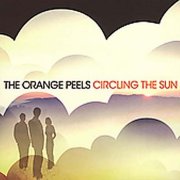 |
Circling the Sun (2005, 34.07) ***½/TTT |
|
| Something in You California Blue Circling the Sun So Right I Don't Wanna Shine Long Cold Summer What's it Like Mary Jo? Tonight Changes Everything |
Boy in Space How Green the Grass |
|
Current availability:
Mellotron used:
California's The Orange Peels seamlessly cross the (admittedly rather narrow) divide between pseudo-late '60s psych and 'sunshine pop', coming across as the bastard offspring of Jellyfish, if I may use such a coarse adjective to describe a band with such a sunny musical disposition. Their third album, Circling the Sun, wins on several fronts, being short enough not to outstay its welcome (hurrah! At last!), with no compositional fluff and excellent performances from all concerned. Best track(s)? Hard to say on a first listen, but opener Something In You is one of the strongest on the album, setting the listener up nicely for the rest of the record.
Mellotron (presumably Terrarium Studios' M400) on most tracks from Allen Clapp and Bryan Hanna, opening the album with strings and flutes on Something In You, faint flutes on California Blue and (semi-)orchestral strings on the rest of the highlighted tracks, making this a surprise Mellotronic treat, assuming it's real, of course... So; a cheerful, summery modern psych album that's well worth hearing, with plenty of Mellotron work to boot. Recommended.
See: Incredible Vickers Brothers
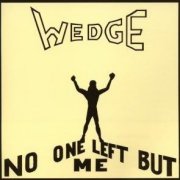 |
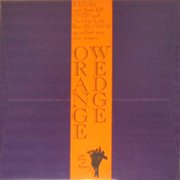 |
No One Left But Me (1974, 34.21) ***½/TTS.P.Hungary Man No One Left But Me Dream Whisky and Gin People The Gate |
Current availability:
Mellotron used:
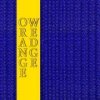 |
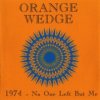 |
There seems to be a little confusion over Orange Wedge (who were, confusingly, also known as Wedge)'s catalogue; one source quotes an eponymous album in 1972, followed by '74's No One Left But Me and there's a Japanese vinyl-only 2-LP set that covers what appears to be all the tracks from both albums. Much of No One Left But Me is rather average hard rock, although it definitely has its moments, not least opener S.P., Dream and The Gate.
Three Mellotron tracks, from OHO's Mark O'Connor, with brief string parts on S.P. and Dream (although the male voices here sound real), leaving the nearest the album gets to major Mellotron use being the strings on lengthy closer The Gate, well in the background, although the initial rather minor part is expanded into quite major orchestration later in the song. This seems to be more one for the collector than the dedicated obscure hard rock fan, although maybe subsequent listens will reveal the album's charms to me. Not bad, not great, some passable Mellotron.
See: OHO
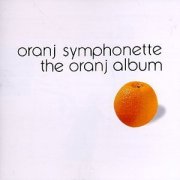 |
The Oranj Album (1998, 49.26) ***½/½ |
|
| Call Me Mister Tibbs The Magnificent Seven Satin Doll Beat Girl Bananas Dreamsville A Man and a Woman After the Fox |
Arabesque Midnight Cowboy Up, Up and Away Chelsea Bridge Valley of the Dolls |
|
Current availability:
Mellotron/Chamberlin used:
Oranj Symphonette are/were a San Francisco-based five-piece, including legendary jazz pianist Dave Brubeck's son Matt, whose remit seems to be to tackle film themes in their own inimitable style. Since the whole band are session musos, the playing is immaculate, as are the arrangements, done with no little humour. I believe The Oranj Album is their second effort, although I can find no trace of any subsequent releases, so they may well have decided it was all too much trouble. A shame, as this is a witty, urbane album, without being at all up itself, taking on Bernstein's The Magnificent Seven, or John Barry's classic Midnight Cowboy without coming unstuck once.
Keys man Rob Burger plays both Mellotron and Chamberlin on Duke Ellington's Satin Doll, with wobbly flutes from one and, er, something from the other, though it's hard to tell what, as the possibles (sax, banjo, piano) are all covered by the real things. Anyway, I enjoyed this vastly more than expected, to the extent that I'd say it's a definite buy for film theme fans, though I'd urge considerable caution on the tape-replay front.
See: Lullaby Baxter
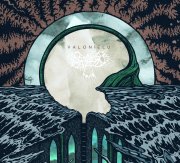 |
Valonielu (2013, 46.18) ***½/T½Vino VersoTyhjä Temppeli Uraanisula Reikä Maisemassa Olen Aukaissut Uuden Silmän Ympyrä on Viiva Tomussa |
Current availability:
 |
Mellotron used:
Finnish black metallers Oranssi Pazuzu opted to record their third album, 2013's Valonielu, at my friend Jaime Gomez Arellano's North London studio, Orgone, hiring my M400, presumably at his urging. For non-scenesters (that'll be me, then), this is possibly best described as 'atmospheric metal', the genre's standard sludgy guitars and growled vocals augmented by keyboards, heavily-effected six-strings and an open-minded approach to song structures, highlights including the quiet-yet-ominous Reikä Maisemassa, the gothy Olen Aukaissut Uuden Silmän (guitar tone straight out of The Banshees' back catalogue) and (relatively) experimental, fifteen-minute closer Ympyrä On Viiva Tomussa.
'Evill' (real name unknown) plays Mellotron strings on Reikä Maisemassa and Ympyrä On Viiva Tomussa and are those murky, pitchbent strings hidden in the mix on Uraanisula more of the same? Unconfirmed. All in all, a good, forward-looking album that will hopefully keep the less hidebound members of the black metal community happy, while possibly even finding the band new fans amongst those who would usually shun the style. Worth hearing.
Orchestral Manoeuvres in the Dark (UK) see: |
 |
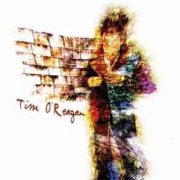 |
Tim O'Reagan (2006, 38.41) ***½/T |
|
| These Things Black & Blue River Bends Highway Flowers Anybody's Only That's the Game Ivy Girl/World |
Ocaso Rosa Just Like You Plaything |
|
Current availability:
Chamberlin used:
Drummer/songwriter Tim O'Reagan joined The Jayhawks in 1995, remaining with the band through their various hiatuses (hiatii?). His only (to my knowledge) solo album to date, an eponymous 2006 release, is a solid alt.country set with the occasional ripping guitar solo to remind us of the man's roots, highlights including Highway Flowers, Anybody's Only and closer Plaything. My only criticism is that a couple of tracks fail to sustain the momentum, but cutting them out would take the album down to around half an hour...
Pete Sands plays Chamberlin strings on Ivy and flutes on Plaything; nothing startling, but always nice to hear. Tim O'Reagan is pretty much an essential purchase for Jayhawks fans, or indeed, anyone into the alt. end of country, featuring good, memorable songwriting and a sound to die for.
See: Jayhawks
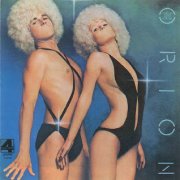 |
Sometimes Words Just Get in the Way (1975, 42.33) **½/½MandyWhile My Guitar Gently Weeps Sometimes Words Just Get in the Way Carnival Street Visions I Shot the Sheriff Drifting Emotion Gimme Shelter |
Current availability:
Mellotron used:
Orion? Although Allmusic give 1975's Sometimes Words Just Get in the Way (their sole album?) a good review, I can't say I'm blown away. Instrumental versions of hits of the day plus a couple of originals, mostly blandly arranged, doth not an especially interesting listen make. Opening with Barry Manilow's Mandy (originally Brandy, by Scott English, fact fans) wasn't their best move, while their flute-led take on Marley's I Shot The Sheriff manages to be duller than Clapton's version. Any better tracks? Closer Gimme Shelter is easily the best thing here, transforming The Stones' urgent original into a laid-back psych jam.
Dominic Francese plays Mellotron, if only just, with background choirs on I Shot The Sheriff and Gimme Shelter. This turns up on download blogs, but I'd be hard-pushed to particularly recommend it.
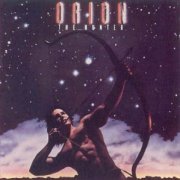 |
Orion the Hunter (1984, 42.25) ***/½All Those YearsSo You Ran Dreamin' Dark and Stormy Stand Up Fast Talk Too Much in Love Joanne I Call it Love |
Current availability:
Mellotron used:
Orion the Hunter were formed by ex-Boston guitarist Barry Goudreau, apparently frustrated by his former bandleader's refusal/inability to finish their stupendously delayed sequel to 1978's Don't Look Back (the album, Third Stage, finally appeared in '86 and wasn't worth the wait). The rest of the band consisted of ex-Heart drummer Michael Derosier, Bruce Smith on bass and the silver-larynxed Fran Cosmo on vocals, who had also sung on Goudreau's 1980 self-titled solo effort and ended up in (surprise surprise) Boston (thanks to Greg for that snippet of info). Orion the Hunter straddles the pomp/AOR divide slightly uncomfortably, leaning more towards the latter style, the former somewhat out of favour by the mid-'80s (too clever, I'd imagine). As a result, despite a strong opener in All Those Years, much of the album slips into commercial tedium, although still a very long way ahead of the new breed of AOR acts coming up at the time, including the execrable Bon Jovi and Britain's 'once good' Def Leppard.
Without a permanent keyboard player, the band used three different musicians, including John Schuller on 'Oberheim organ' (presumably the pseudo-Hammond sound heard here and there) and Mellotron. Not that he overuses it, mind; background choirs on So You Ran and what I think are a couple of choir chords, either doubled with polysynth or heavily effected, at the beginning of Stand Up. So; not a Mellotron album, but if you go for that pomp thing, chances are you'll like some of this.
 |
Uomo di Pezza (1972, 31.46) ****½/TT½Una Dolcezza NuovaGioco di Bimba La Porta Chiusa Breve Immagine Figure di Cartone Aspettando l'Alba Alienazione |
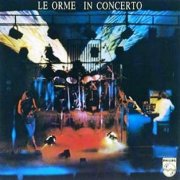 |
In Concerto (1974, 45.53) ***½/TTTruck of Fire (parte I)Truck of Fire (parte II) Sguardo Verso il Cielo Preludio a Era Inverno Era Inverno Rittorno al Nulla Collage (Sigla) Collage |
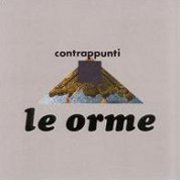 |
Contrappunti (1974, 33.33) ****/TContrappuntiFrutto Acerbo Aliante India La Fabbricante d'Angeli Notturno Maggio |
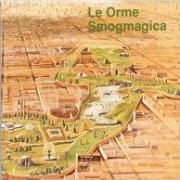 |
Smogmagica (1975, 36.05) ***/TLos AngelesAmico di Ieri Ora o Mai Più Laserium Floyd Primi Passi Immensa Distesa Amanti di Città L'Uomo del Pianino Laurel Canyon |
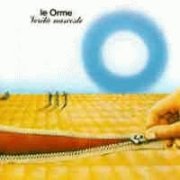 |
Verità Nascoste (1976, 41.20) ***½/TInsieme al ConcertoIn Ottobre Verità Nascoste Vedi Amsterdam... Regina al Troubadour Radiofelicità I Salmoni Il Gradino Più Stretto del Cielo |
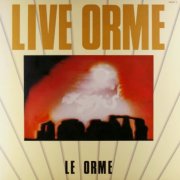 |
Live Orme (1986, recorded 1975-77, 120.20) ***½/½ |
||
| Contrappunti Maggio India Premessa a Gioco di Bimba Gioco di Bimba Era Inverno Introduzione a Truck of Fire Truck of Fire Preludio a Frutto Acerbo Frutto Acerbo |
Alianto Cemento Armato Era Inverno La Porta Chiusa Collage Whole Lotta Love Aqualung Suite (Felona e Sonora) Sospesi Nell'Incredibile I Due Pianeti Ritorno al Nulla |
Regina al Troubadour Radio Felicità Laserium Floyd Aspettando L'Alba Sguardo Verso il Cielo Collage Maggio |
|
Current availability:
Mellotrons used:
Like several other Italian prog outfits, Le Orme (The Footprint) had been around since the '60s, starting as a beat group. Their early albums, Ad Gloriam and L'Aurora Delle Orme, are apparently more psych than progressive, while 1971's Collage has been compared to ELP (same keys/bass/drums lineup, too), but by '72's Uomo di Pezza, they'd discovered their own voice. It's a wonderful album, folk-influenced material rubbing shoulders with full-on symphonic prog, sounding not totally dissimilar to PFM at times, although I realise that's a rather lazy comparison for an Italian band. It's inescapable, though, when you hear songs of the sheer quality of Gioco Di Bimba or Aspettando L'Alba. Toni Pagliuca is known more as a Hammond player, but his inventive synth and Mellotron work stand out here, with particularly good Moog parts on Figure Di Cartone and La Porta Chiusa. This last has what I take to be Mellotron brass chords, but they're completely overshadowed by the strings on Breve Immagine, not to mention the gorgeous polyphonic flute part on Aspettando l'Alba. A stunning album, with great Mellotron to boot. You need to own this record.
Le Orme followed Uomo di Pezza with their finest hour, the superb (if Mellotron-free) Felona e Sorona (****½), also released in an English-language version as, er, Felona and Sorona, lyrics by Peter Hammill. However, when it came to sticking out a live album, In Concerto, the band chose to go back to their earlier style, playing no fewer than three tracks from Collage, one brief snippet of Felona and a side-long largely improvisational piece. Pagliuca had his Mellotron on stage with him and the first (and by far the longest) part of Truck Of Fire has some brass under a swooping Moog, although most of the track consists of a rather regrettable drum solo. Part 2 has more of the same, as does Sguardo Verso Il Cielo, while Era Inferno (I think) has another bloody drum solo! Strings at last on Collage, so there's actually quite a bit of Mellotron, though most of it's rather inessential, to be honest.
Contrappunti is generally regarded to be their last great album and, while not quite up to its two studio predecessors, it's pretty good, although no one track really stands out. One Mellotron track only, too, with strings on the balladic Frutto Acerbo, plus plenty of the string synth that's also splattered all over Felona. By the following year's Smogmagica, Le Orme were beginning to lose the plot (Ora O Mai Più, most of side two), heading towards pseudo-commercial territory, although it's possible that some of the dodgier music pokes fun at consumerist America, though this is a complete guess. The only Mellotron here is a string arpeggio and monophonic melody, plus distant choir chords on Los Angeles, so given that the album overall fails to excite, I really wouldn't bother. After I'd carefully listened to Verità Nascoste for Mellotronic evidence, I opened the album's gatefold, to find track-by-track credits. Oh well, at least it proves my ears still work (just). The album's a definite improvement over its predecessor, but they'd moved on from their classic early-'70s days, so the songs are shorter and more conventionally structured, not to mention a lack of instrumentals. Sole Mellotron track this time round is Regina Al Troubadour, with an upfront string melody, although I'd hardly call it an album highlight.
In 1986, Japanese label Nexus released the surprisingly lengthy, vinyl-only Live Orme, a bits'n'pieces set apparently recorded between May 1975 and April 1977, although more specific dates seem difficult to source. Proving that their live approach hadn't changed overmuch in the several years since In Concerto, there's much jamming in evidence, not to mention tiny snippets of Whole Lotta Love and Aqualung, feeling like hangovers from their covers-band days. A fair chunk of the near-half hour Felona excerpt is taken up by a tedious drum solo, while several named tracks are no more than medleys of their best-known sections, making for a rather overlong set, if truth were told. Pagliuca's Mellotron, while present, is barely used (bearing in mind that this is sourced from more than one date and he may not have had it on stage later on), with the occasional string swell on the first version of Maggio being the only obvious use, although it's possible that it turns up elsewhere, heavily-reverbed, used as an effect. Overall, while a decent enough document of the band's mid-'70s act, this is something of a 'fans only' release. Italian label Black Widow reissued this in 2009, with five bonus tracks, although the chances of them featuring any more Mellotron are slim.
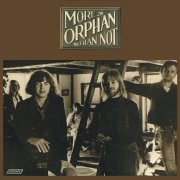 |
More Orphan than Not (1974, 35.36) **½/T |
|
| That's What You Said Sometimes I Wonder About You Be Yourself Don't Go Foolin' Me Overtime What Goes on You Give Me Such Good Lovin' You Don't Know How I Cry |
Train of Glory Have Yourself a Good Time for Me I've Been Working |
|
Current availability:
Mellotron used:
Boston's Orphan were one of around a million identikit 1970s American bands, tempering their country/rock with hints of R'n'B and soul, making a perfectly pleasant yet undemanding sound that probably sounded good on car radios. Vocalist/guitarist Eric Lilljequist clearly led the band, writing most of the material on 1974's groanworthy More Orphan than Not (notably You Don't Know How I Cry), although they also tackled a handful of covers, including The Beatles' What Goes On and Van Morrison's I've Been Working.
Dan Frye plays Mellotron, with orchestralish strings on Don't Go Foolin' Me, although the brass on (slightly) jamming closer I've Been Working is real. Orphan must have achieved some success, as it was their third (admittedly also their last) release, but, these days, sounds very much of its time.
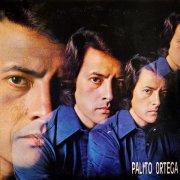 |
Un Canto a la Vida (1974, 37.05) **/T |
|
| Cae la Lluvia No Hay Que Aflojarle a la Vida Quiero Saber Cómo Te Va Había una Ves una Niña Todas las Mañanas Vivir Con Alegría Adiós Ya No Te Creo Cirilo Ha Muerto |
Canción de Entrecasa Pensá, Si No Tenés la Culpa Los Infieles Fue Muerto y Crucificado |
|
Current availability:
Mellotron used:
Ramón Bautista Ortega "Palito Ortega" Saavedra is an Argentinian superstar, almost entirely unknown outside the Latin world. After listening to 1974's Un Canto a la Vida (oddly listed on Discogs as 1970, although the instrumentation used says otherwise), I can see why. It's an absolute horror of an album, the cheesiest '70s Latin pop you can imagine, doubtless hugely popular in Ortega's home market, but practically unlistenable elsewhere. Any better moments? Possibly the balladic Canción De Entrecasa; still cheesy, but seemingly heartfelt and blissfully bereft of the sickly-sweet orchestrations used across most of the record.
An unknown studio musician plays Mellotron (which one and on which continent is unknown), with upfront strings and what sound like male voices on Había Una Ves Una Niña, although all the album's other string parts are real. Do you need to hear this? Don't be silly.
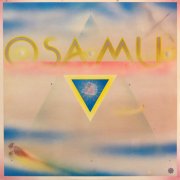 |
Osamu (1977, 40.44) ***½/½Sui-InFrost Flowers Hear the Rain, See it Fall Endless Steps Yesterday and Karma Purple Hills and Crystal Streams Elemental Spirits Fur, Fin and Feather Sui-Yo |
Current availability:
Chamberlin used:
Osamu Kitajima is usually referred to as a new age artist, although his early albums are more in the pre-world music line, successfully combining Eastern and Western influences before such things became fashionable. His debut, 1976's Benzaiten, is an interesting fusion of styles, although it's his follow-up, '77's Osamu, which concerns us here. Comprised of roughly equal parts of traditional Japanese music, jazz, funk and rock, with the occasional vocal track (notably Yesterday And Karma), it's all over the place musically, albeit in a good way; Elemental Spirits almost sounds like '80s King Crimson, three years early, while the koto on several tracks gives the album the requisite far-Eastern feel.
Brian Whitcomb plays Chamberlin, with cellos on one of the album's more 'ethnic' tracks, Endless Steps, although I think the strings on Yesterday And Karma are string synth. This was only, finally, issued on CD in 2019, along with his other early albums, although I'm sure they'd sell well to the new age crowd. Or maybe not; they could be too eclectic for that highly restrictive market, falling between too many stools. Prog/fusion fans who aren't averse to a little ethnicity could do a lot worse than to track copies down, though not for Osamu's minimal Chamberlin use.
Osanna (Italy) see: |
 |
 |
Relish (1995, 61.19) ****/T½ |
|
| St. Teresa Man in the Long Black Coat Right Hand Man Pensacola Dracula Moon One of Us Ladder Spider Web |
Let's Just Get Naked Help Me Crazy Baby Lumina |
|
Current availability:
Mellotron used:
My lodger at the time Relish came out (hi, Dave) used to play this album constantly, to the point where I'm amazed it sounds so unfamiliar eight years on. I wasn't expecting to like it at all, so I was pleasantly surprised to find that Osborne's raunchy, bluesy voice and vaguely Tom Petty-ish material actually still sounds pretty good, even though she's played Lilith Fair with all the usual suspects. The album contains Joan's biggest hit, the overly-catchy One Of Us, which caused some upset in religious circles at the time; so, you're not allowed to say "What if God was one of us"? The rest of the material is more 'down home', Joan's excellent voice riding over the top of the warm, natural sound of the album, probably helping it to avoid sounding dated.
The instrumentation is largely analogue, with loads of Wurly piano, plus a smattering of Hammond and Mellotron, which I can't believe I didn't spot at the time. Mellotron from keys man Chris Palmaro and drummer Rob Hyman, who gets a few string chords in on One Of Us. Palmaro adds a strings pitchbend on Spider Web and some nice flute work on Let's Just Get Naked, but the relative paucity of the Mellotron limits its overall rating.
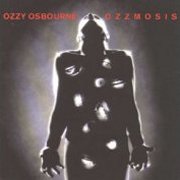 |
Ozzmosis (1995, 56.50) ***/T½ |
|
| Perry Mason I Just Want You Ghost Behind My Eyes Thunder Underground See You on the Other Side Tomorrow Denial My Little Man |
My Jekyll Doesn't Hide Old L.A. Tonight |
|
Current availability:
Mellotron used:
After Ozzy left/was kicked out of Black Sabbath, he surprised everyone by returning with a killer band and two great albums in Blizzard of Ozz (****½) and Diary of a Madman (****), before the tragic death of his wunderkind guitarist, Randy Rhoads, an event from which the Ozz is said to have never truly recovered. As the '80s progressed, Ozzy's albums tended to follow the mainstream, largely consisting of undistinguished commercial hard rock, as he stumbled through various addictions, leaving him the sorry figure you've probably gawped at on The Osbournes, which has to take the prize for one of the most bizarre programme concepts ever, against stiff competition.
Ozzmosis was Ozzy's seventh studio solo album, the second (?) to feature on/off Sabs bassist Geezer Butler, not that he makes any great difference to the album's content, to be honest. Guitarist Zakk 'Mastermind' Wylde (his real name, surely?) stamps his authority (as they say) all over the record, although he's frequently stymied by the rather average material on offer. Highlights include Perry Mason and Thunder Underground, but I'm afraid this is no match for Ozzy's first two efforts. Keyboards are played by producer Michael Beinhorn (no stranger to the Mellotron himself) and, surprisingly, Rick Wakeman, who I believe last worked with Ozzy on Sabbath's Sabbath Bloody Sabbath, over twenty years earlier. I'm sure I found a reference on Rick's site to the effect that he played Mellotron on Ozzmosis, but I can't currently find it; it's highly unlikely, anyway, so we'll go with Beinhorn. Despite the generic sampled strings on several tracks, that's rather muted Mellotron choir on See You On The Other Side, Tomorrow and My Little Man, while the strings on Old L.A. Tonight, alongside sampled ones, are the most Mellotronically convincing thing here.
See: Black Sabbath
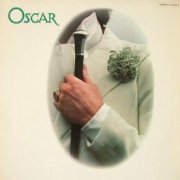 |
Oscar (1974, 35.54) **½/TTWell Known LadyGood Loving Woman Encore After Encore Hugo (Can You Hear Us) Feel Alright Looking Thru the Eye Never Comin Back Shady Lady Lord of the Night |
Current availability:
Mellotron used:
Oscar were one of a multitude of British pop/rock bands of the mid-'70s, never really committing to any one style and, as a possible result, eventually falling between the cracks. I can't say for certain, but I get the impression that keyboard player Tony Bamforth has promoted himself as 'Oscar Bamforth' in recent years, although I could be barking up the wrong tree. Anyway, 1974's Oscar is sort-of glam rock, vocalist Brian McGladdery coming across as a vaguely low-budget/Hammer horror Screaming Lord Sutch on several tracks. The album opens with a strange, wartime-style ditty, Well Known Lady, quickly shifting into the era's pounding drums (no synchronised handclaps, though), particularly on Good Loving Woman and Feel Alright, while a few other tracks are at the poppy end of the hard rock spectrum. Confused? So were they. Sadly, none of it's that good, although some of it (notably rather silly closer Lord Of The Night) is at least entertaining.
Bamforth played Mellotron strings on Looking Thru The Eye, Shady Lady and Lord Of The Night, with a nice solo part on the last-named. I've seen multiple copies of the CD of this on eBay as 'buy it now's, making me think Bamforth is getting them pressed (or running off CD-Rs) himself and flogging them that way. Do you bother? Only if you're really into obscurities from the era, although three Mellotron tracks may help to tempt you.
 |
The Green Chapel (2021, 44.23) ***½/TTT |
|
| Phantasm Moscow The Inmost Light part 1 The Inmost Light part 2 Diamonds in the Wishing Well Count Magnus The Green Chapel I: The Green Chapel The Green Chapel II: Blind Hare & the Pale Lady |
The Green Chapel III: Winter's End The Green Chapel IV: My Lord the Sun The Crow |
|
 |
Current availability:
Mellotron used:
After several years of telling them, the Osiris Club chaps (or at least, drummer Andy Prestidge) finally used my M400 on an album. Their third studio release, 2021's The Green Chapel, does a similar thing to their first two, combining prog, metal and '90s grunge into an appealing stew of prog that rocks like a bastard, without straying into dreaded prog-metal territory. Faults? I struggle a little with the vocal stylings, which are closer to indie than any of the band's other influences, but that's simply a matter of taste. Highlights? Propulsive opener Phantasm and the quarter-hour or so of the four-part title track, perhaps.
Andy plays Mellotron, with high strings on Phantasm, Moscow, strings and choirs on The Inmost Light Part 1, reverbed-to-fuck flutes on part I of The Green Chapel, er, The Green Chapel and part II, Blind Hare & the Pale Lady, strings on part III, Winter's End and strings and flutes on part IV, My Lord The Sun, used fairly sparingly throughout. At last! Actual Mellotron on an Osiris Club record! Let's see if we can pull this trick off again next time 'round, eh, chaps?
See: Samples etc. | Morlock | Zoltan